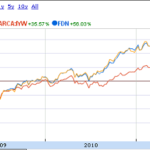This post is sponsored by BMW.
For 2012, AAA projects 93.3 million Americans will travel 50 miles or more from home during the year-end holidays, which is 1.6% greater the 91.8 million people who traveled last year. Â This stat alone got me thinking a bit. Â Does this mean the economy is really improving? Â I mean do you actually base whether you’re going to head out to see family on how strong the economy is? Â Or is this more a function of simple demographic growth, and/or perhaps even the lower gas prices we’re seeing at year-end now versus last holiday season? Â I don’t know; in our case, we’re hosting, so we have family coming out to us. Â Here were some additional stats I found to be interesting regarding travel in 2012 for holidays:
- Holiday air travel expected to increase 4.5 percent to 5.6 million travelers from 5.4 million in 2011
- Median spending expected to increase almost six percent to $759, compared to $718 in 2011 with transportation costs consuming about 29 cents of every travel dollar.
- Average distance traveled to increase to 760 miles round-trip from 726 miles, an expected result with an increase in air travelers
- Travel volumes for the year-end holidays are generally very stable, only once in the past decade has there been a change in travel volume greater than five percent
- The average distance traveled by Americans during holiday period is expected to be 760 miles, further than last year when travelers planned to log 726 miles.
Well, since most Americans travel by car (us included, when we do travel for holidays), if you haven’t seen this piece by BMW, it’s certainly worth a watch. Â Regardless of whether you drive a BMW or are thinking of buying a new car in the near future, it certainly gets you psyched to go home for the holiday and reunite with friends and family. Â Take a look:
On that note, let us know what your holiday plans are this season. Â I’m also curious about your take on the behavioral and economic thesis discussed at the open – are there financial or economic factors that actually influence whether or not you’d travel for say, Thanksgiving, Christmas, Labor Day weekend, etc? Â In our case, we usually have plans laid out well in advance of say, a lousy GDP number or a gas price spike and we wouldn’t reverse course based on the broader economy or gas price inputs, but evidently, when you model broader scale US travel data, there usually is some correlation. Â No different than consumer spending, capital expenditures from businesses, hiring, etc., I suppose.










{ 0 comments… add one now }